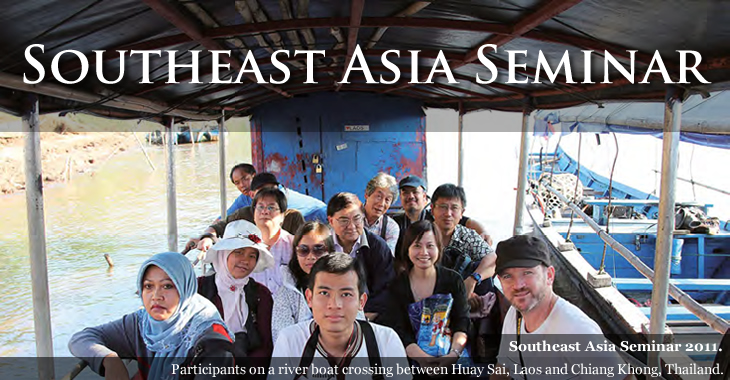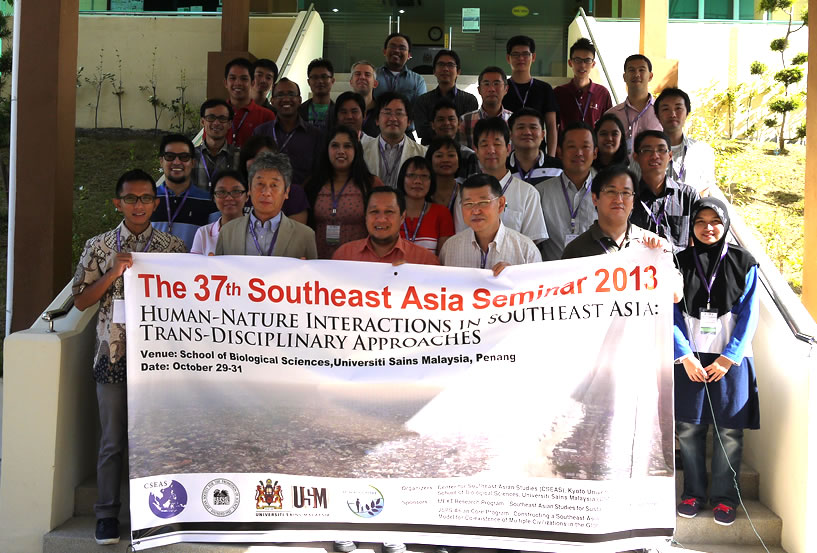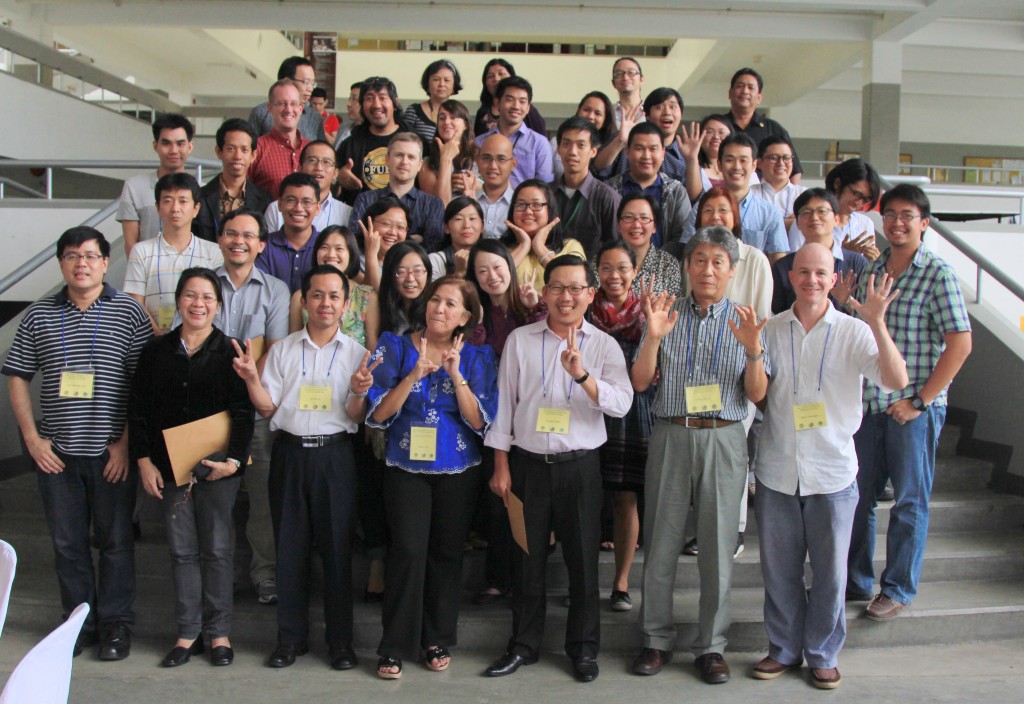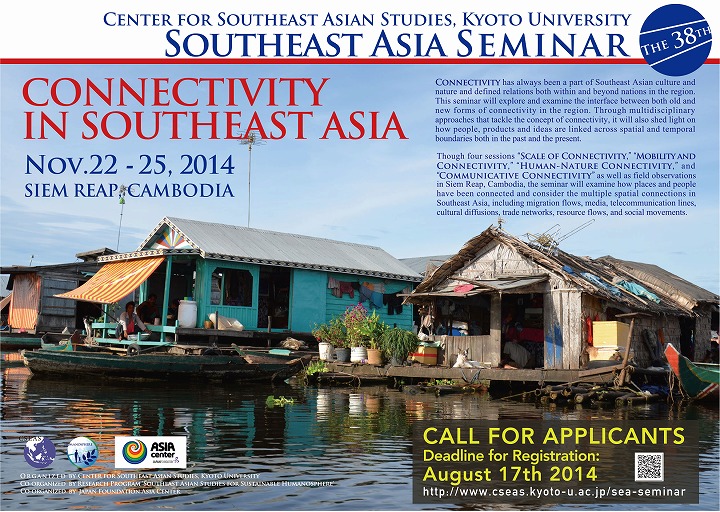
The Southeast Asia Seminar has been held every summer since 1977. Initially, the seminar ran for two weeks, offering intensive lectures that provided an overview of the nature, culture, society, economy, and other aspects of the region and the basic knowledge needed to understand the concept of area studies. Subsequently, it became more topically focused, and the period had been shortened to one week for the convenience of participants. The seminar is open to the public and has attracted numerous participants each year, particularly postgraduate students starting their engagement with Southeast Asian studies. Since the 1990s, with the increase in similar seminars off-campus, we attracted continued interest by choosing relevant topics and changing the format of participation. In seeking to go with the times, at the 33rd seminar in Kyoto, we attempted an all-English seminar including lecturers from outside Japan. Since then, we have been holding a series of seminars in different countries in Southeast Asia, and participants have applied from all over the world. It provides a great opportunity for Japanese graduate students and post-doctoral researchers to exchange ideas with young scholars outside of Japan. The 36th seminar was held in collaboration with the Cebuano Studies Center of the University of San Carlos and was entitled “Cities and Cultures in Southeast Asia.” 20 researchers from 13 nations in Southeast Asian and also the U.K., Germany and the U.S. participated. The seminar has come to offer a framework for exchanges between young and upcoming scholars in the region.
Southeast Asia Seminar 2017 【Deadline: September 10】 »
Southeast Asia Seminar 2014
– Connectivity in Southeast Asia –
Connectivity in Southeast Asia:
Multidisciplinary approaches to understanding global transformations
Organized by the Center for Southeast Asian Studies, Kyoto University
Connectivity has always been a part of Southeast Asian culture and nature and defined relations both within and beyond nations in the region. This seminar will explore and examine the interface between both old and new forms of connectivity in the region. Through multidisciplinary approaches that tackle the concept of connectivity, it will also shed light on how people, products and ideas are linked across spatial and temporal boundaries both in the past and the present.
Vibrant forms of connectivity have always existed in Southeast Asia. However, how did cultural, religious, political, and economic flows enable long-distance connectivity between places and peoples across the region in the past? And what are the significant new lines of connectivity that enhance or disrupt the old modes of connectivity?
Increasing participation in a global economy, increasing mobility, and regional integration has accelerated connectivity in people’s lives in Southeast Asia at a national, regional, and global level. People, goods, services, and information are moving faster than ever creating new connections. Under these dynamic global conditions, how are the mutual interactions between human activity and the natural environment changing?
In 2015, Southeast Asia will undergo a major transformation and become ASEAN Economic Community (AEC). On one hand, this shows an effort to formalize region-wide connectivity and integration. What forms of grassroots and informal connectivity are emerging in the region? How will institutional connectivity between nations and across civil societies influence each other?
The seminar will focus on themes of particular relevance to reviewing connectivity in Southeast Asia from a multidisciplinary perspective in order to assess the dynamism and interconnectedness of the region. We approach this region in terms of connectivity: historical, geographical, religious, and cultural through five sessions. We will examine how places and people have been connected and consider the multiple spatial connections in Southeast Asia, including migration flows, media, telecommunication lines, cultural diffusions, trade networks, resource flows, and social movements.
The Southeast Asia Seminar has been held annually by the Center for Southeast Asian Studies, Kyoto University since 1977. Organized thematically around a variety of topics, the seminar offers three full days of intensive lectures by experts in the field and group discussions and presentations by the participants.This year, the Southeast Asia Seminar will be an international seminar held in Siem Reap. It is currently looking for applications from young and up-and-coming scholars in Southeast and East Asia. Applications
Friday, 21 November 20:00-21:00 Welcome Cocktail Hour Saturday, 22 November 9:00-9:30 Welcome Remarks by Prof. Kono Yasuyuki, Director, CSEAS, Kyoto University 9:30-10:00 Orientation (Kobayashi Satoru) and Self-Introduction 10:00-12:00 Keynote speechby Prof. Ang Choulean, APSARA Authority and Royal University of Fine Arts, Cambodia 12:00-14:00 Lunch at the hotel 14:00-16:00 Session1: Connectivity in Angkor and Tonle Sap Chair: Dr. Kobayashi Satoru (Kyoto University) Siem Reap is one of the best places to explore interconnections between traditional and new forms of connectivity. The ancient kingship of Angkor is believed to have constructed a cultural communications hub that stretched across a large part of mainland Southeast Asia, about a thousand years ago. At present the region attracts large numbers of tourists from all over the world through the ecological charms of the Tonle Sap Lake, a great lake which expands to three times its size in the rainy season. 16:00-16:15 Coffee break 16:15-17:45 Q&A and Discussion Chair: Dr. Nathan Badenoch (Kyoto University) 18:30 Dinner together Sunday, 23 November Chair: Dr. Kobayashi Satoru (Kyoto University) This mobile workshop is designed to deepen our understanding of historical and contemporary connectivities in the Angkor/Tonle Sap region, which will be discussed on the first day (Session1). Participants will be divided into three groups prior to departure. All of the groups will leave Siem Reap town fro Domdaek, a rural area about 30 kilometers east of the town, to observe ancient canals used for transporting monument sandstones. The group will then visit Kampong Khleang, an island community in Tonle Sap Lake to study the diverse forms of connectivity in people’s lives. Monday, 24 November Chair: Dr. Imamura Masao (Kyoto University) Southeast Asia has an exceptionally rich history of long-distance connections. These are connections within what we call “Southeast Asia” today; for example, the Khmer and Thai enjoyed intimate cultural contacts for many centuries—especially during the pre-colonial period. There are connections beyond this region too; Southeast Asia has had cultural, commercial, and political contacts with both East Asia, South Asia and the Middle East for many centuries. The rich diversity of religion, culture, and language across Southeast Asia reflects the histories of these long-distance connections. 10:30-11:45 Q&A and Discussion Chair: Dr. Ishikawa Noboru (Kyoto University) 12:00-14:00 Lunch at the hotel 14:00-16:00: Session4: Mobility and Connectivity: speed, direction, and intensity Chair: Dr. Mario Lopez (Kyoto University)
The past 15 years have seen Southeast Asia undergone immense infrastructural, technological, social and cultural change. The Greater Mekong Region (GMS) has seen unparalleled development and the CLMV countries are experiencing an unprecedented period of spatial connectivity. These changes will be marked in 2016, by the creation of the Asian Economic Community (AEC). This has raised the optimistic view that this will lead to the intensification of cross-border trade, both within the newly unfurling spatial connectivity and just as importantly, in conjunction with the economic growth of neighboring countries in East Asia. Roads, airports, the electrification of rural areas, the penetration of telecommunications networks, and an increase in regional and international tourism in the region, are shaping interaction across and within nations. 16:00-16:15 Coffee break 16: 15-17:45 Q&A and Discussion Chair: Dr. Mario Lopez (Kyoto University) Tuesday, 25 November Chair: Dr. Iga Tsukasa (Kyoto University)
This session will discuss connectivity and communication within the context of contemporary Southeast Asia. Given the region’s cultural and linguistic diversity, scholars have noted how people’s connectivity is not limited to a single cultural reference, but more on social contexts, belonging and community. This context presents us with diverse linguistic and social milieu. Information (news, rumors, etc.) comes from many different sources and in different mediums – influenced by the needs of heterogeneous societies. In this context, the media landscape in Southeast Asia has undergone a drastic transformation due to technological innovations making access to real-time information an everyday experience for many in the region. 10:30-11:45 Q&A and Discussion Chair: Dr. CLAUDIO Lisandro Elias Es(Kyoto University) 12:00-16:00 Lunch at the hotel and Group work 16:00-17:45 Group presentations Chair: Dr. Nathan Badenoch and Dr. Imamura Masao (Kyoto University) 17:45-18:00 Closing remarks Wednesday, 26 November
Co-organized by the research program of “Southeast Asian Studies
for Sustainable Humanosphere”
Co-organized by the Japan Foundation Asia Center
Supported by the ASEAN Center, Kyoto University
Supported by the APSARA Authority
Supported by Faculty of Development Studies, Royal University of Phnom Penh
Participation is free. Roundtrip airfare, accommodation, and per diem allowance for the seminar will be covered by the sponsors.
We are accepting applications for the seminar. Successful applicants will be contacted toward the end of August.
Program 2014: PDF »

Arrival of Participants in Siem Reap, Cambodia
8:30-9:00 Registration
This session aims to illustrate the dynamic connections that existed among the ancient powers in the Angkor period as well as examine the contemporary livelihoods of people in the region. It will explore the interconnectedness of traditional and new forms of connectivity in the Angkor/Tonle Sap region to foment discussion on the contours of connectivity in Cambodia.
Mr. Im Sokrithy (APSARA Authority) and Prof. Shibayama Mamoru (Kyoto University) will introduce the research results of the East-West Cultural Corridors Project, which has explored inter-regional connectivity in ancient mainland Southeast Asia. Dr. Hang Peou (APSARA Authority) will give a lecture on water management/governance during the Angkor period and focus on ancient technologies and the past environment.
The discussion will then turn to the contemporary livelihoods of people in the region. Dr. Kobayashi Satoru (Kyoto University) will give a lecture on the historical formation of regional society around the Tonle Sap region and Dr. Hori Mina (Kochi University) will present on fishery activities and value chains of fish trade in Tonle Sap Lake.
7:30-17:30 Session2: Field trip to Domdaek and Kampong Khleang, Siem Reap
The participants will listen to a series of on-site talks covering such issues as the archeology of ancient transportation networks (Mr. Im Sokrithy), Theravada Buddhist temples as places of connectivity (Dr. Kobayashi Satoru), and Tonle Sap Lake fish trade networks (Dr. Hori Mina). Throughout the trip, the participants are required to record individual observations, exchange opinions and discuss research issues within each group.
8:30-10:30 Session3: Scale of connectivity: place, boundary, and distance
In this session, we will investigate spatial connections that cross national and regional boundaries. By highlighting the dynamics of these connections, this panel will challenge two conventional perspectives: (a) nation-states are separate and discrete entities, (b) “Southeast Asia” is a separate and distinct region.
Dr. Imamura Masao (Kyoto University) will open the panel discussion by reviewing translocal connections between Southeast and other regions by drawing attention to how translocal religions have travelled to/from/through Southeast Asia. His talk with be followed by Dr. Oiyan Liu (The University of Hong Kong) and her presentation on a history of Chinese diaspora in Southeast Asia. Her talk will show how, in certain geopolitical and historical circumstances, migrant connections were used to redefine territorial belonging. The third presentation will be given by Dr. Dave Lumenta (University of Indonesia), who will investigate the dynamics of the Malaysia-Indonesia border in the island of Borneo. The focus of his talk will be the various effects of this boundary demarcation. Each panelist will engage with the reading material “Southeast Asia—an idea whose time is past?” by presenting their thoughts on the debate, and inviting critical reactions from the seminar’s participants.
These new configurations are compelling new flows of capital, creating new industries accompanied by new forms of labor migration; from the highly skilled, to the undocumented. Within this context, what does this period of intense movement, connectivity and mobility mean for the region? How will changes matter to people in Southeast Asia?
This session brings together three experts who work on intra-regional changes taking place in the region. Dr. Thanyathip Sripana (Chulalongkorn University) will discuss the impacts of ASEAN Synthesis in the region and what it will mean for the future of Southeast Asians. Dr. Yagura Kenjiro (Hannan University) examines mainland Southeast Asian in the context of labor migration between nations. Finally, Mr. Men Prachvuthy (Royal University of Phnom Penh and Mekong River Commission) will present a detailed overview of current tourism development in Siem Reap, Cambodia and flesh out its implications for the nation’s nascent tourist industry.
9:30-10:30 Session5: Connectivity and Communication: information, media, and vernacular
In this session, Dr. Iga Tsukasa will discuss the relationship between the media and political movements in Malaysia. While the media is expected to serve as a main source of information for the government, there is a parallel wave of activism among the urban residents who are responding in quite different terms to the political situation in the country. Dr. Nathan Badenoch, an anthropologist/linguist working in Laos will also share his ongoing research on the use of local vernaculars on the radio in Laos. This broadcasting is one of the only ‘official’ voices using minority languages, but gives important insights into the Lao multi-ethnic state. Finally, Dr. Carlotte Setijadi (Nanyang Technological University) will give a lecture on ethnic Chinese representation in the media.
Leave Siem Reap
Group Photo Gallery

Group Photo of Participants on the 37th Southeast Asian Seminar, Universiti Sains Malaysia 29-31 Oct. 2013

Group Photo of Participants on the 36th Southeast Asian Seminar,Cebuano Studies Center, University of San Carlos 20-23 Nov. 2012
Past Southeast Asian Seminars (in English)
-
Year Date Theme Country 2014 2014.11.22- 2014.11.25 Connectivity in Southeast Asia:
Multidisciplinary approaches to understanding global transformationsCambodia 2013 2012.10.29- 2012.10.31 Human-Nature Interactions in Southeast Asia:Trans-Disciplinary Approaches Malaysia 2012 2012.11.20- 2012.11.29 Cities and Cultures in Southeast Asia Philippines 2011 2011.11.22- 2011.11.25 The Transformations of Human Landscape in Southeast Asia Thailand 2010 2010.10.20- 2010.10.23 New Concept Building for Sustainable Humanosphere and Society from the Equatorial Zone of Southeast Asia Indonesia 2009 2009.10.7- 2009.10.11 “Region” and Regional Perspectives on/from Southeast Asia Japan
*All Seminar prior to 2009 were in Japanese. The list can be viewed here (in Japanese only)

